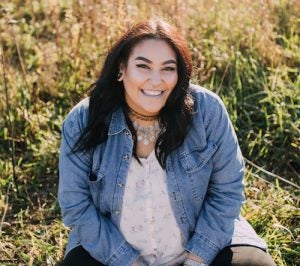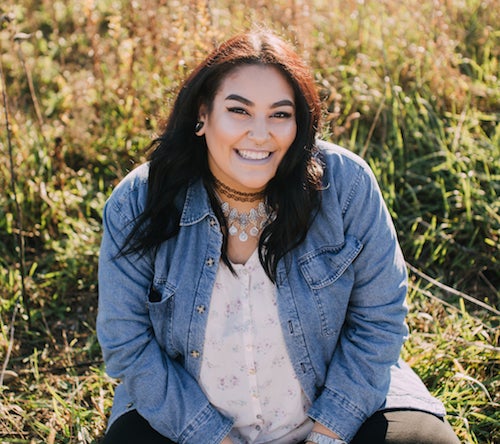For her senior capstone project, psychology major is telling a story that represents many
 The teasing started in middle school: whale; fat girl; jelly rolls; Mrs. Puff. Paola Moreno got so depressed she stopped eating breakfast and lunch.
The teasing started in middle school: whale; fat girl; jelly rolls; Mrs. Puff. Paola Moreno got so depressed she stopped eating breakfast and lunch.
“I didn’t want people at school to see me eating,” says Moreno. “I didn’t want people to think of me as the fat girl having a burger.”
Today, Moreno eats what she wants and likes what she sees in the mirror.
For her senior capstone project at the University of Rhode Island, the Providence resident is telling her story and the stories of four other URI students in an effort to put an end to body shaming.
“Simply Beautiful” was one of 40 projects presented recently at the Showcase of Undergraduate Research, Scholarly and Creative Works on the Kingston campus. Moreno, who is majoring in psychology and Gender and Women’s Studies, wrote a paper and created a poster.
“I decided on this topic because I really want people talking about body positivity and the horrific effect of body shaming on women who are not thin,” she says. “I want to be a role model.”
Body image is something most females struggle with at some point in their lives, says Moreno. She blames our culture, which equates beauty with slenderness. “If you are not thin or you don’t have an hourglass body,” she says, “you are not considered beautiful.”
Growing up, Moreno says she was always known as the “chunky kid.” It didn’t help, she says, that she ate recklessly, living on a fast-food diet that was affordable and accessible in her neighborhood.
But she didn’t feel shame until middle school. A boy she had a crush on rejected her in a very public and humiliating way: “He said he didn’t know if he could wrap his arms around me,” she describes.
Devastated, she says she “starved” herself at school, only to binge at night. “And you know the worst thing about it? I didn’t lose weight. I became the big girl that did not eat.” The bullying continued in high school with insults like, “I didn’t know Levis made jean sizes for fat people.”
“I completely hated myself,” she says. “I hated myself because I wasn’t pretty enough.”
The freshmen course “Introduction to Women’s Studies” in the Gender and Women’s Studies program changed her life. She shared her struggles with her classmates, and came away feeling that she was “beautiful the way I was.”
“That course molded me into the person I am today,” she says. “It taught me how to love myself.”
For her capstone project, she interviewed four other URI students, all of whom shared similar stories of bullying, low self-esteem, despair and, eventually, happiness. One student talked about how her parents put her on a vegetable-only diet and forced her to work out daily, starting at the age of 8. Another student spoke of her frustration being unable to find clothes her size in popular clothing stores.
“She said it was so unfair,” says Moreno. “She wanted to feel beautiful but it was hard because plus-size women do not have many options in most clothing stores.”
Like Moreno, the students talked about struggling with eating disorders and depression. Some blamed their families for a lack of support and for pressuring them to diet to look like thin siblings and relatives.
Moreno cited a study by sociologist Catherine Ross, who found that being overweight does not necessarily lead to depression; what makes people depressed is the judgment from others.
“Depression and eating disorders are not something that happened because I woke up one day and decided to be that way,” says Moreno. “It is a sickness we developed because society has a hard time accepting who we are.”
Moreno says she is done letting her weight define her.
“People expect women to be thin and beautiful with no imperfections,” she says. “We have to break those norms. At the end of the day, we are in charge of our own bodies—no one else but us—and it’s important we feel great in those bodies.”
Mindy Levine, an associate professor of chemistry and co-organizer of the research showcase, says Moreno’s honesty can help other women intimidated by cultural expectations of beauty.
“People should understand that body image issues and shaming do not only affect women of certain ages,” says Levine. “This is a problem that has affected me personally, and I commend Paola for focusing our attention on this important topic.”
Moreno’s project is “wonderful and brave,” says Rosaria Pisa, director of the Gender and Women’s Studies program and a sociology professor.
“Paola’s project challenges conventional expectations of female beauty and body size to declare I am beautiful just as I am,” says Pisa. “This is a powerful message that more girls and young women need to hear.”

